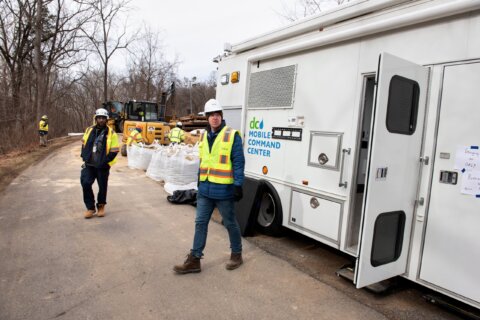For more than 40 years, the Humane Rescue Alliance and the District of Columbia’s Department of Health have had an agreement on the handling of everything from sheltering animals to corralling strays and investigating cruelty cases.
Soon, the roles of the nonprofit and the D.C. agency will change. The contract that HRA held with the District will expire at the end of the year.
Kate Meghji, the HRA’s chief operating officer, explained what the change will mean for D.C. residents.
Meghji stressed that many of the details are still being worked out but the most common questions have equally easy answers.
Under the planned changes, the District would handle dog bites, reports of aggressive dogs or dogs at large. However, the HRA would handle investigations into animal cruelty.
In the case of lost dogs or suspected rabies, the District would handle those.
“That would be the District, or whoever they contract with. I want to caveat this, because we don’t know,” Meghji said of the animal operations conducted at the New York Avenue animal shelter, that is currently operated under the contract with D.C. government.
When asked for more detail, Meghji explained, “My understanding is that there will be a (request for proposal) and they are planning to contract out functions like that.”
Why the change?
“We had to kind of talk about the realities of what is required by the contract,” Meghji said of why the change is being made after a 44-yearlong HRA contract for animal care in the District. “For both HRA and the District, finances are tight.”
The decisions over which entity should tackle which functions are still being worked out, said Meghji.
“We went through a lot of months where we went through what was going to work,” said Meghji.
She said the HRA laid out four different models when “the District notified us a couple of weeks ago that they would be taking on all of the contract-related services.”
Some functions will remain under the purview of HRA. For example, “Our humane law enforcement which was part of the Congressional charter will continue to be at the cornerstone of the work that we do,” she said.
The HRA’s humane officers are not police, but they do enforce laws having to do with animals. The HRA humane officers were involved in a suspected cruelty case involving 31 dogs earlier this year in February when a man in a barricaded home shot at police officers, wounding three of them.
“That team is absolutely extraordinary,” said Meghji, referring to the humane officers who work closely with the Metropolitan Police Department.
The HRA has operated both the New York Avenue shelter in Northeast D.C. and a smaller shelter at Oglethorpe Street in Northwest. Meghji said the HRA plans on continuing to operate its smaller shelter on Oglethorpe.
Meghji said finances are challenging for shelters all across the country.
“Pre-COVID, we were all rocking and rolling. Euthanasia was decreasing, adoptions were increasing,” Meghji said. “We had this magical period of time where our communities opened up their homes and all of these animals went into foster homes and we really thought — we as an industry really believed — we figured something out.”
“We started seeing things change,” she added. During and after COVID, the number of dogs — large dogs in particular — coming back into shelters grew and so did the length of time those animals spent at shelter facilities.
“They were staying in shelters much, much longer and they weren’t getting adopted as quickly,” said Meghji.
Meghji cites changes in the economy, the rising costs of veterinary care, the rising costs of housing and the lack of pet-friendly housing as factors that “make it tough to adopt a dog.”
Meghji said animal advocacy groups like hers hope to be able to see changes that allow more people to adopt pets: “We’ve got plenty of human beings living in our community who would love to adopt and take home a pet, who simply don’t have access to the resources to do it. And I don’t think that should be a reason someone shouldn’t get to have a pet.”
Get breaking news and daily headlines delivered to your email inbox by signing up here.
© 2024 WTOP. All Rights Reserved. This website is not intended for users located within the European Economic Area.








